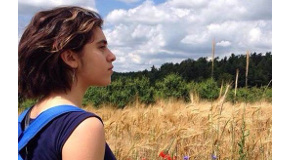
BY LARA ARIKAN
larisarikan@gmail.com
I’ve spoken two languages for as long as I can remember. I regard both with infinite tenderness. I use English rather more often, for discourse and science and poetry; I am familiar with its twists and oddities and revel in every one – there is no better language to write in if you’d like to be conceptual, no better structure to use for distant intimations. I’ve always had a little difficulty doing that in Turkish: I feel that Turkish is larger and more fragile, heavy and volatile, and I’m terribly out of my depth if I choose to poeticize. I’ve got to admit that it fascinates me, this almost corporeal difference in my languages, and the way I sense my way through them varies such that I can be utterly incapable of laying down arguments in one and excel at doing so in the other. It is for this reason that I want to provide a short exposition of the Turkish language, in which my intention will be not didactic but confessional – this piece is only a personal view of what I have for so long found so difficult to handle, related through the odd bias of a person whose fascination rests entirely in the physical scope and versatility of the Turkish linguistic body, and its startling bent for poetry.
The grace of this language lies in its simplicity. Turkish is able to communicate through several well-chosen words a remarkable amount of mute emotion; its tone and character intimate much plainness and distance, the robustness of the Anatolian people. Reserved and obstinate, with a hard manner and roughness of spirit, the Turkic nomad (in all his variably romantic presentations) has retained much of his old steppes and straits; the Turkish language forms as this capacity for ferocity, for piety and sobriety and choking inertia, settles into literature. For instance, the solid largeness of Veysel’s poems is swollen with this tacit recognition of life as it is, direct and unapologetic and achingly plain in word and emotion. “I have embraced many, calling them friends,” he says in his sharp singing voice; “my faithful lover is the black earth.” In two short lines he has echoed the common sentiment of the nomad, involved as he is with the quick turns of nature, and combined it with affection and apprehension into the stoic watchfulness of the farmer, devoted to the soil with a love no less nomadic. Veysel has opened up this overwhelming bond to communicate both sorrow and cynicism, laying out without pretension the remote intensity with which he regards the world; accompanied only by his bağlama, he demonstrates with rough, provincial beauty the plaintive tune of his language.
This brusque purity nevertheless reflects only a fraction of the Turkish character; it is too reminiscent of a past age, of a people with old values and manners and self-perceptions. The Turks of today rarely demonstrate such coarse eloquence; they remain slow, steady and cautious, and easily become hostile. It is a new age, with an urbanized, disillusioned people tired from years of uncertainty and misinformation. But there is much of the same fierce reserve that remains, in people I have only the time to see in increments; there is something strangely big and solid in this cold, defiant land with all its prickly slopes and valleys. The only problem is that none of this is expressed quite so readily any longer – a language is tied inextricably to its speaker, and I feel Turkish has become rather quiet of late.
That’s not to say it’s not still wonderful. I like Turkish not only for its economy, but because I find it to have a structure exceptionally methodical, well-suited to the way I think – and then there are parts of the language that never fail to move me. The grammar that makes Turkish so concise and conducive to solitude, the inherent grace in forms of address, the tendency to blend different words and cultures into speech and song are to me what make the language so perfectly literary. Essentially it’s a very physical language; it can be really wild, and I think that’s delicious – Yunus Emre and his love of God, Nazım Hikmet and his revolution, Ottoman armies marching to the simple line, “You Turkish people – love your nation fiercely, with love,” and Atatürk’s sharp field command, “I am not ordering you to fight, but to die,” – it all embodies with such precision the grounded turbulence of the Turk, and through a few plain turns of language. I love it. There’s nothing so hard to handle as Turkish in motion, and nothing so beautiful when treated correctly. There’s nothing more difficult than this.
I was not raised to be bilingual. I learned my languages through chance, by being exposed to them in turn with the brash perception of a toddler. This natural flow between cultures has allowed me to observe from a distance the loveliness of both, and to see much more clearly my shortcomings in using them. I am better at writing in English, I speak it very often, but I am bound more tightly to the other, for which I have much reverence; I can sense in the construction of one sentence or another the nature of its speaker with absolute clarity, and tell you how that speaker could have fit into Turkey at a particular time. The tremulous love poetry of Bedri Rahmi Eyüboğlu is as quiet with affection as Orhan Veli Kanık’s is with amusement when he declares, “It’s this good weather that has ruined me,” and they both smell of İstanbul. “Which is yet more distant to me,” Nazım asks wearily, “my home, my youth or the stars?” His question is the simple, solemn one of an exile. Turkish is like this; it’s stubborn and yearning, and I’ve never been more proud to call a language my own. There’s nothing better than this.
